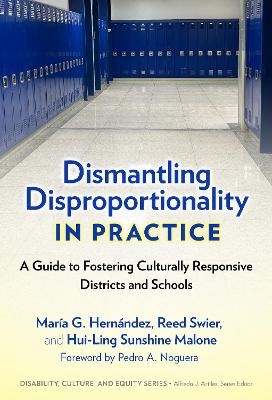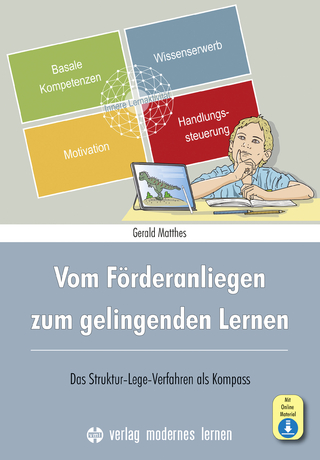
Dismantling Disproportionality in Practice
Teachers' College Press (Verlag)
978-0-8077-6944-7 (ISBN)
This resource offers culturally responsive processes and concrete tools to address disproportionality and create more equitable schools. The authors draw on their work with school districts to demonstrate how using a theory of change can address disproportionate outcomes of special education placement and exclusionary discipline for students of color. Educational institutions can use this application guide to build educators’ capacities in culturally responsive–sustaining education (CR-SE) so that they respond better to the needs of racially, culturally, and linguistically marginalized students, families, and communities. The book includes chapters dedicated to the process of an equity audit to identify and tackle the root causes of disproportionalities and approaches for partnering with young people toward creating an environment every student deserves. It also addresses the critical self-reflective work that is foundational to shift the experiences and outcomes of Black, Latinx, Indigenous, and multilingual learners; students with an IEP; and students with intersecting identities. Use Dismantling Disproportionality in Practice to guide your work with district and school leaders and staff, teachers, families, and youth.
Book Features:
● This companion to Dismantling Disproportionality: A Culturally Responsive and Sustaining Systems Approach (2023) offers lessons learned from a former state-funded technical assistance center.
● Applicable tools and processes to help school districts confront beliefs, policies, procedures, and practices that result in disproportionate outcomes and experiences.
● A holistic look at what equitable and culturally responsive schools look like and actionable steps for creating these spaces.
● Tangible exercises and examples from two decades of experience centering equity within school systems.
● Guidance for partnering with youth to create equitable, systemic change alongside school leadership.
María G. Hernández has over a decade of experience partnering with pre-K–12 educators, providing technical assistance and training to develop culturally responsive education systems that address disproportionality and equity. Reed Swier is a former elementary teacher and administrator currently providing culturally responsive training and technical assistance to educators and district leaders. Hui-Ling Sunshine Malone is an educator, researcher, consultant, scholar-activist, and an assistant professor of education at the University California, Santa Barbara.
Contents
Foreword xi
Preface xv
Acknowledgments xvii
1. Introduction 1
The State of the Work 4
So What Can This Active Equity Work Look Like? 5
Moving Systems 6
Setting the Table for Systems Work: Processes for CR-SE Engagement 7
What to Expect in the Proceeding Chapters 14
2. Authentic CR-SE: Tackling Beliefs Through Self to System Reflection and Action 15
Why Culturally Responsive-Sustaining Education (CR-SE)? 15
Foundational Understandings (Preconditions) Critical to CR-SE and Self to System Work 17
From Foundational Understandings to CR-SE Self to System Application 24
Connecting Self to System 34
Critical Questions 35
3. Understanding the Root Cause Analysis Process 37
Framing the Importance of the Root Cause Process 40
Preconditions for Root Cause Analysis 40
The Root Cause Analysis Process 45
Root Cause Analysis Tools 46
Promising System Shifts 56
Conclusion 58
Critical Questions 59
4. Applying an Inquiry Approach: An Example Root Cause Analysis Process 61
Garner Central School District: Applying a Root Cause Analysis 63
Grounding the Work in a Moral Imperative 64
District Data Analysis 68
Examining Key Policies and Practices 77
Policy and Practice: Code of Conduct and Discipline Referral Form Examples and Advanced Placement, Honors, International Baccalaureate, and Gifted and Talented Form 85
Examining Staff Beliefs 97
Getting to Root Causes 99
Action Planning After a Root Cause Analysis 103
Directions as You Move Through Action Planning 112
Action Planning Tip 112
Avoiding Detours: District Successes and Challenges 113
Conclusion 115
Critical Questions 115
5. How Can Districts and Schools Leverage Student Voice in Addressing Disproportionality? 117
(Re)Defining Disproportionality 118
Solidifying Sustaining Youth-Adult Partnerships 118
Establishing the Partnership 120
Establishing a Contact Zone 124
Political Education 128
The YPAR Project 128
Conclusion 138
Critical Questions 139
6. Conclusion 141
From Self to System 142
Commitment to Doing the Work: Voices from CSC CR-SE Work 144
District Example Building Educator and Systemic Capacity 148
Conclusion and What Is Next? 150
Glossary 153
Endnotes 155
References 157
Index 163
About the Authors 171
| Erscheinungsdatum | 25.04.2024 |
|---|---|
| Reihe/Serie | Disability, Culture, and Equity Series |
| Vorwort | Pedro A. Noguera |
| Verlagsort | New York |
| Sprache | englisch |
| Maße | 156 x 229 mm |
| Gewicht | 272 g |
| Themenwelt | Sozialwissenschaften ► Ethnologie |
| Sozialwissenschaften ► Pädagogik ► Sonder-, Heil- und Förderpädagogik | |
| Sozialwissenschaften ► Soziologie | |
| ISBN-10 | 0-8077-6944-4 / 0807769444 |
| ISBN-13 | 978-0-8077-6944-7 / 9780807769447 |
| Zustand | Neuware |
| Haben Sie eine Frage zum Produkt? |
aus dem Bereich


